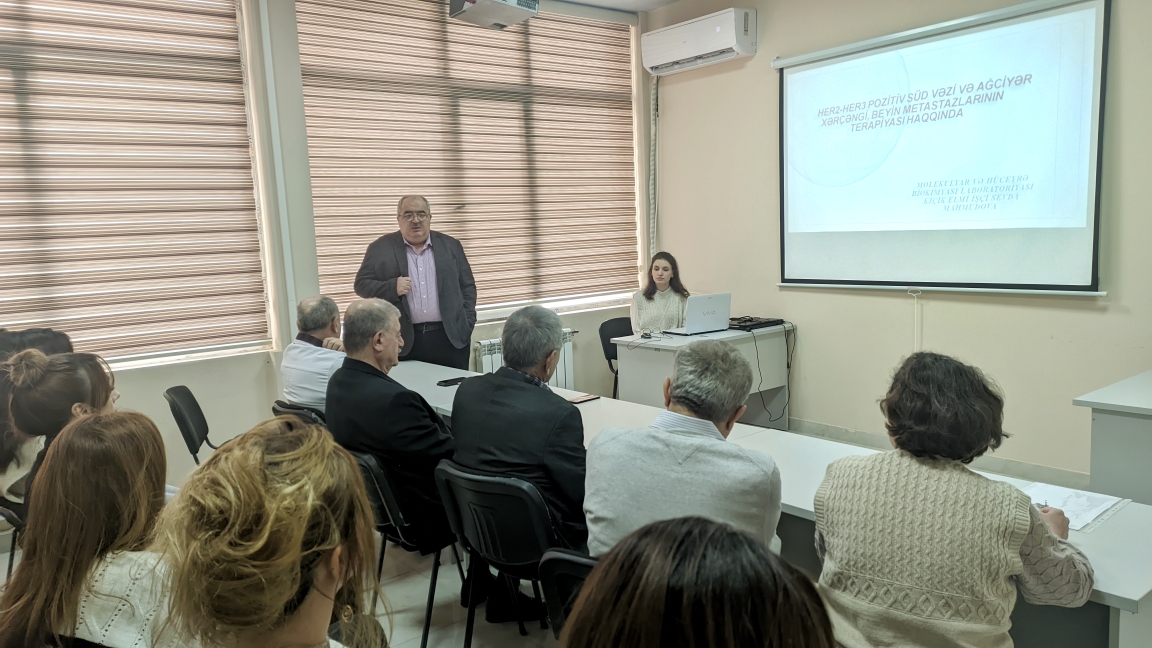
At the Institute of Biophysics, a scientific seminar was held on the topic "Therapy of HER2-HER3 Positive Breast and Lung Cancer, Brain Metastases." The seminar was opened by the General Director of the Institute of Biophysics, corresponding member of the Azerbaijan National Academy of Sciences (ANAS), Oktay Gasimov, who welcomed the participants and highlighted the relevance of the topic for modern medicine, emphasizing the importance of new approaches in cancer treatment.
Following the introduction, Sevda Mahmudova, a junior researcher from the Molecular and Cellular Biochemistry Laboratory, presented on the topic "Therapy of HER2-HER3 Positive Breast and Lung Cancer, Brain Metastases." In her presentation, S.Mahmudova discussed the structure, functions, and oncogenic effects of HER2. She explained that HER2 is a tyrosine kinase receptor with a molecular weight of approximately 140 kDa as a polypeptide and 185 kDa in glycosylated form. Furthermore, she noted that it is encoded by a gene located on the short arm (q22) of chromosome 17 and functions independently of ligands.
S.Mahmudova added that the overexpression of the HER2 receptor is observed in 15-30% of breast cancers, often associated with metastasis and other highly aggressive tumors. Additionally, HER2 overexpression is found in stomach, ovarian, uterine, colorectal, bladder, and head-and-neck carcinomas. She highlighted that Immunohistochemistry (IHC) and Fluorescence In Situ Hybridization (FISH) are used to accurately identify HER2-positive cancer types. Specifically, the FISH method confirms HER2 gene amplification, providing a more precise roadmap for treatment.
The presentation detailed various therapeutic targets related to HER2, including the functions and mechanisms of drugs like trastuzumab, pertuzumab, lapatinib, and neratinib. It was noted that trastuzumab binds to domain IV of the HER2 receptor to inhibit intracellular signaling, while pertuzumab blocks signal transduction by preventing receptor dimerization. Mechanisms of resistance related to HER2 were also discussed, explaining the role of HER3 in activating the PI3K/Akt signaling pathway, which supports cancer cell survival.
Following the presentation, Dr. Karim Gasimov elaborated on the importance of the degradation and regulation of HER2 and HER3 receptors in preventing the spread of cancer cells. Gasimov highlighted that the p53 protein plays a central role in inducing apoptosis (cell death) in damaged cells and noted that the weakening of p53 function in HER2-HER3 positive cancer cells could lead to metastatic processes. He emphasized that the degradation of HER2-HER3 receptors and interference with their signaling pathways are crucial targets in therapeutic strategies.
The seminar included discussions, and the participants' questions were answered. Concluding the seminar, Professor Oktay Gasimov emphasized the significance of the information presented for modern oncology and noted that the seminar was highly informative. He mentioned that the institute’s future research would focus on this area and praised the progress made by the laboratory led by Dr. Karim Gasimov.
In closing, on behalf of the institute’s leadership and seminar participants, Sevda Mahmudova was thanked for her engaging and in-depth presentation, and she was wished success in her future research endeavors.